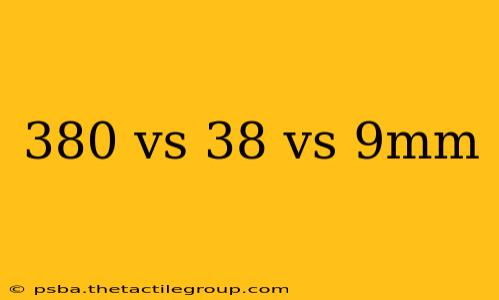Choosing the right caliber for self-defense or concealed carry is a crucial decision, and the .380 ACP, .38 Special, and 9mm are popular contenders. This in-depth comparison will explore the ballistic properties, stopping power, recoil characteristics, and suitability for different users and applications of each cartridge. We'll delve beyond simple bullet comparisons, examining real-world implications and considerations for responsible firearm ownership.
Ballistic Performance: A Deep Dive
Let's examine the key ballistic characteristics that define each round's effectiveness:
.380 ACP (.380 Automatic Colt Pistol)
- Caliber: 9mm (.380 inch)
- Velocity: Typically ranges from 850 to 1100 feet per second (fps) depending on the load and firearm.
- Energy: Generally lower than the .38 Special and 9mm, resulting in less stopping power.
- Penetration: Moderate penetration, often sufficient for self-defense within typical engagement distances. However, over-penetration is less of a concern compared to more powerful rounds.
.38 Special
- Caliber: .38 inch
- Velocity: Varies widely based on load, from approximately 750 fps to over 1000 fps for +P rounds.
- Energy: Significantly higher than the .380 ACP, offering increased stopping power.
- Penetration: Greater penetration than .380 ACP, making over-penetration a more significant consideration. The use of appropriate ammunition is critical.
9mm Parabellum (9x19mm)
- Caliber: 9mm (.355 inch)
- Velocity: Typically ranges from 1100 to 1300 fps depending on the load and firearm.
- Energy: Generally higher than both the .380 ACP and .38 Special, delivering greater stopping power.
- Penetration: Similar to the .38 Special, penetration is a key factor requiring careful ammunition selection. Over-penetration is a potential concern, especially with higher-velocity rounds.
Recoil and Shootability
Recoil is a subjective experience, but generally:
- .380 ACP: Offers the lowest recoil of the three, making it highly manageable for smaller-framed individuals or those new to firearms.
- .38 Special: Moderate recoil, manageable for most shooters but more noticeable than the .380 ACP.
- 9mm: Higher recoil than the other two, demanding a firmer grip and more controlled shooting technique.
Stopping Power and Self-Defense Effectiveness
Stopping power is complex and depends on various factors beyond just ballistic performance, including shot placement. However, based on energy and penetration:
- 9mm: Generally considered to offer the highest stopping power among the three.
- .38 Special: Provides greater stopping power than the .380 ACP.
- .380 ACP: Offers adequate stopping power at close range but may be less effective at longer distances or against larger targets.
Concealed Carry Considerations
The choice of caliber for concealed carry often involves balancing stopping power with concealability and shootability.
- .380 ACP: Small size and low recoil make it ideal for pocket carry and for those prioritizing concealability above all else.
- .38 Special: Can be concealed, but often requires a larger firearm, making it less suitable for deep concealment.
- 9mm: Widely available in compact and subcompact firearms suitable for concealed carry, offering a balance of stopping power and concealability.
Conclusion: Choosing the Right Caliber
The "best" caliber depends entirely on individual needs and preferences. The .380 ACP excels in concealability and ease of use, the .38 Special offers a good balance, and the 9mm provides superior stopping power but with increased recoil. Consider factors like your physical strength, experience level, and the specific application (self-defense, concealed carry, target practice) to make an informed decision. Always practice safe firearm handling and seek professional training before carrying a concealed firearm. Remember to consult with experienced firearms instructors and experts for personalized advice.

